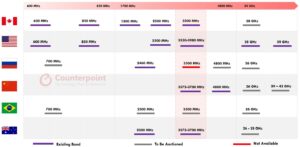Canada 5G Spectrum Auction May Boost Competition
With Canada’s 3500 MHz auction ending, the focus has shifted to the setting up of 5G networks by license winners as well as the competitive landscape of the country’s wireless market. The auction, which started on June 15, saw participation from 23 Canadian companies, which together made 108 bids over 25 days. This was the highest-grossing spectrum auction in Canada’s history, closing with $7.06 billion (USD) spent. The country’s ‘Big 3’ telecommunication network companies –Rogers, TELUS and Bell – cornered most of the available spectrum with 738 licenses costing $5.80 billion.
Comparison with US auction
The highest-grossing Canadian auction was not unique and was only following the trend visible in the neighboring US. Earlier this year, the US 5G C-band auction brought in over $81.11 billion for licenses and an additional $13 billion for incentive costs. With a grand total of $94 billion, this was the most expensive mid-band auction worldwide. Again, as in Canada, the US’ biggest post-paid channels were the three largest bidders in this auction. Verizon, AT&T and T-Mobile collectively spent $89 billion for licenses and incentive costs.
The high prices that carriers have been paying for these licenses are imperative to understanding the importance of 5G network in the future of wireless technology. As the newest smartphones are 5G compatible, carriers are under pressure to keep pace with the technology.
Why is 3500 MHz auction important for Canada

5 g服务在加拿大只有可用的刺ough the ‘Big 3’ carriers, which leveraged their existing low- and mid-band spectrum assets, primarily used for 4G LTE, to build a 5G network. The network access to regional carriers and MVNOs has also been very restrictive. The latest 3,500 MHz auction will bring the capabilities for a true 5G wireless network to Canada while also providing access to carriers outside of the ‘Big 3’. The auction opens up the possibility of a new national competitor with Videotron owner Quebecor buying over 300 licenses for $657 million. Other notable purchases made during the auction were from Cogeco (spent $234 million) and Xplornet ($193 million).
Impact of Videotron
A consistent issue Canada’s wireless market has experienced is thelack of variety and competition. Regional players are not strong enough to set up a 5G network outside of the heavily populated hubs in provinces like Ontario, Quebec and British Columbia.
Smartphone Penetration in Canada
Canadians pay such high prices for wireless connectivity that there is a demand from consumers to increase competition to lower costs. Videotron owner Quebecor has expressed interest in expanding its network outside Quebec.
Canada needs a 5G network to boost innovation with IoT and keep up with technological advancements that other countries are working on. 5G will increase wireless rural connectivity across Canada as well as build a fixed wireless access (FWA) network to minimize the cost of laying fiber optic cables. US carriers like AT&T and Verizon have made plans to develop smart factories and other projects to gain from their5G networks.Canada must also quicken its 5G deployment to start working on the technology’s other profitable segments.


